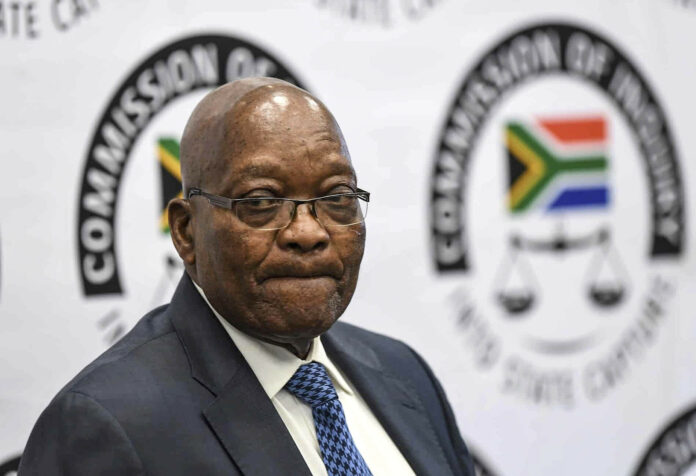Justice Raymond Zondo has issued a summons for Jacob Zuma to appear before him in mid-November after the former president has eluded the state capture commission for more than a year. Recent revelations have cast family matters as central to the conflict between the two men, but will these bring clarity or muddy the waters as South Africa seeks the truth about state capture?
“Zuma” is a key word in my database — compiled from the top stories appearing in the main IOL, News24 and TimesLive email newsletters each morning — of 76 top online news articles for October, appearing 86 times. By comparison, “Covid-19” appears only 75 times. It is clear why Zuma’s attempts to dodge the Zondo commission have captured so much media attention: the corruption that took place during Zuma’s presidency has caused immense damage to the country, and the commission’s work would be incomplete without giving him the chance to answer the many allegations against him.
State capture was portrayed as a family affair in October’s news, as shown by an examination of the words statistically most closely associated with “Zuma”. The names of Gugulethu Zuma-Ncube and Thuthukile Zuma, two of Zuma’s daughters, appear first and second on the list. The Sunday Times reported that the Zondo commission has issued a subpoena for the bank account information of Zuma-Ncube’s TV production company, among a list of more than 20 accounts linked to the family. Thuthukile Zuma has controversially been nominated to the board of the National Youth Development Agency. Although the Sunday Times article mentioned her, it did not directly link her to the Zondo commission’s subpoenas.
The other family term closely associated with “Zuma” is “sister”. In most instances, this is a reference to the recent revelation that Zondo had a child with Jacob Zuma’s sister-in-law about 25 years ago. Zondo made this admission in response to Zuma’s lawyer Eric Mabuza (another name showing a strong association with “Zuma” in the database), who claimed that “the deputy justice was biased against his client due to their historical and family relations”. These claims are now at the centre of Zuma’s bid to have Zondo recuse himself from the matter.
The word “sat”, which is also closely associated with “Zuma” on the database, reflects Zondo’s response to this bid. He says “That Mr Zuma happened to marry the sister of a woman with whom I had had a relationship that ended so many years before that marriage has never had any bearing on the execution of my judicial functions in the many matters involving Zuma in which I have sat as a justice of the Constitutional Court since 2012. Nor does it have any bearing on the execution of my duties as chairperson of the [state capture] commission.” He added that Zuma has not before raised any concerns about bias in any of these cases in which he has sat as judge.
Interestingly, the word showing the strongest association with “Zondo” in the news is “patience”, in the context that Zondo has lost patience with Zuma. This portrays him as an authority figure who has graciously endured a subordinate’s delaying tactics for a long time, but now is justifiably angry.
A biblical parallel
The portrayal of the Zumas-versus-Zondo tussle as a family drama reminds me of the epic biblical story of Joseph, told in Genesis 37-46. In both stories, a once-powerful aged patriarch called Jacob and his large clan find themselves beholden to a man who, in a dramatic plot twist, is revealed to have a family connection to them. Both stories happen against the backdrop of an international economic crisis. In both, members of the big family have an opportunity to face up to their previous misdeeds before their righteous long-lost “relative”.
Of course, the similarities pretty much end there. I find Zondo’s argument that his family connection to the Zumas is tenuous to be quite convincing. Both Zuma and Zondo are now estranged from the partners that provided the connection. And I haven’t yet seen any explanation from the Zumas as to exactly how this connection has caused Zondo to be biased against them.
It is tempting for the news media to portray Zuma’s attempts at evading the Zondo commission as a family affair, because of the human interest it brings to the story. But these portrayals also have the danger of distracting us from the commission’s main objective: uncovering the truth behind allegations of state capture.
In the Zumas-versus-Zondo story, as in the Joseph narrative, a nation’s economic well-being is at stake. Will South Africa be able to show that it can hold its previous president accountable for corruption? If we cannot do so, that will be a continued deterrent to investment that will keep weighing down our economy.
In the Bible, Joseph’s story ends with the truth being revealed and his family repenting for their past crimes. For South Africa’s sake, let’s hope that will be how the current Zuma saga ends.



